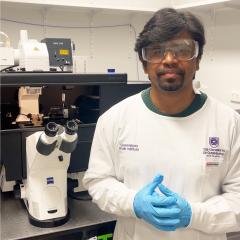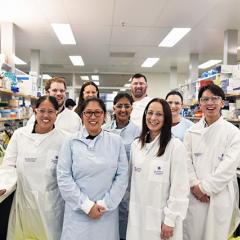A world-wide competition pitted human against machine in a virtual high-tech car chase last weekend.
The competition raised money for spinal cord injury research – helping a University of Queensland researcher develop a new treatment.
UQ School of Biomedical Sciences Associate Professor Marc Ruitenberg is one of few Australians to receive a Wings for Life Foundation grant.
“The race had become a way to celebrate those living with spinal cord injuries and boost research efforts into finding a cure,” Dr Ruitenberg said.
“Funding has enabled us to find a new treatment for spinal cord injury that targets the harmful inflammation following immediate injury.
“It has been long recognised that inflammation following injury can cause further damage to the spinal cord, but it has been challenging to find a treatment to target it efficiently.”
Dr Ruitenberg’s research has found intravenous immunoglobulin (IVIG), a therapy already in use for other conditions, can reduce the harmful inflammation that arises in the spinal cord following trauma, thereby minimising the amount of tissue damage.
“Funding from the Wings for Life Foundation enabled us to demonstrate the effectiveness of this therapy in acute spinal cord injury, and to turn this into a world-first clinical trial,” he said.
“This research gives people living with spinal cord injuries hope of a better chance of recovery and that finding a cure will one day become a reality.”
Runners in the Wings for Life run took off with a 30 minute head start before the ‘Catcher Car’ was on their tail, racing to overtake them and end their turn.
The Brisbane race looped around the UQ athletics track and had pro-surfers Mick Fanning and Mark Mathews, snowboarder Alex ‘Chumpy’ Pullin and Iron Woman Jordan Mercer among its competitors.
Dr Ruitenberg has taken part in the event every year, and will participate this time in Munich.
“This really is a global effort and we were very lucky for our work to be deemed relevant to funding and to hopefully make a difference to the lives of those affected by spinal cord injury.”
Media: Associate Professor Marc Ruitenberg, m.ruitenberg@uq.edu.au; Faculty of Medicine Communications, med.media@uq.edu.au, +61 7 3365 5118, +61436368746.



